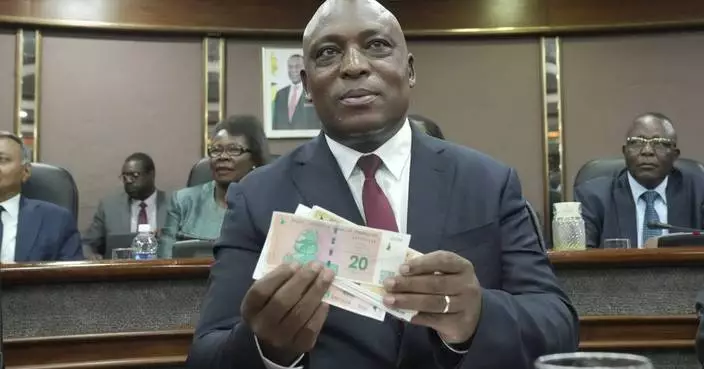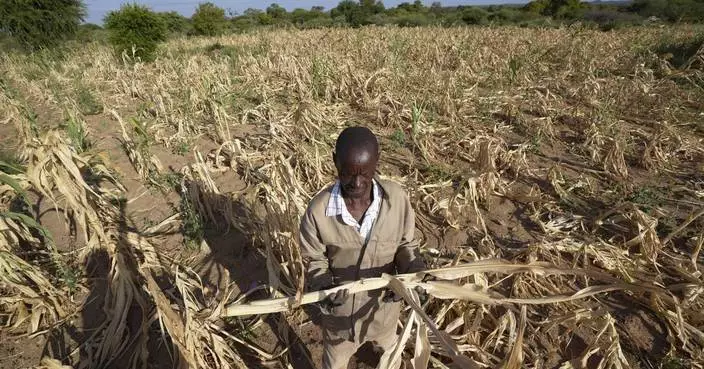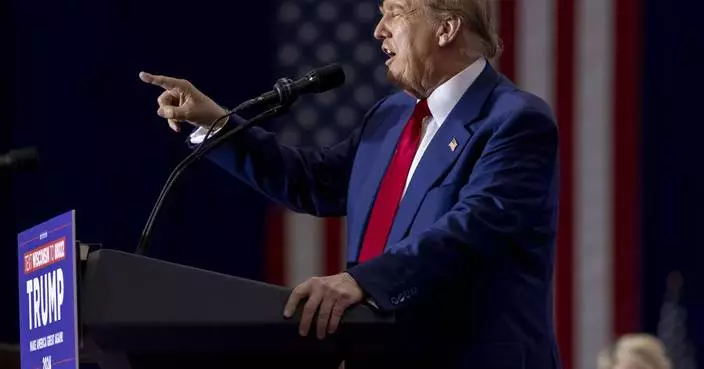As the body of Zimbabwe's main opposition leader awaits repatriation home for burial, his party already faces nasty power struggles to replace a man praised by both allies and rivals for his tenacious fight for democracy.
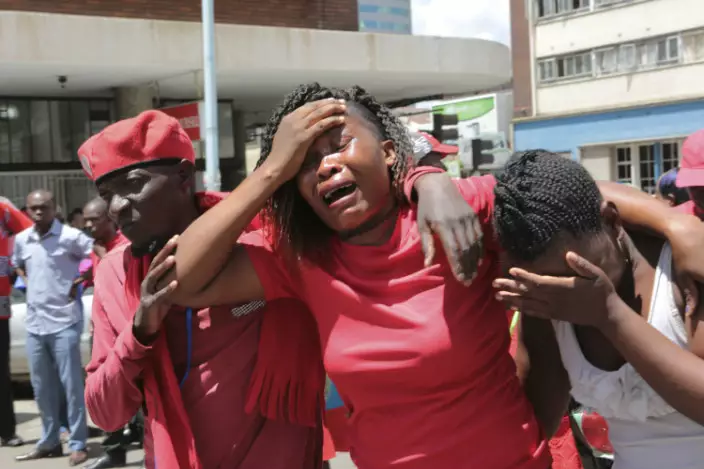
Supporters of Morgan Tsvangirai can hardly hold back their tears outside the party headquarters in Harare, Thursday, Feb, 15, 2018. (AP Photo/Tsvangirayi Mukwazhi)
That fractured opposition gives President Emmerson Mnangagwa a virtually clear road to winning the first post-Robert Mugabe election in the months ahead.
Click to Gallery
As the body of Zimbabwe's main opposition leader awaits repatriation home for burial, his party already faces nasty power struggles to replace a man praised by both allies and rivals for his tenacious fight for democracy.
That fractured opposition gives President Emmerson Mnangagwa a virtually clear road to winning the first post-Robert Mugabe election in the months ahead.
A day after his death, thousands of mourning supporters gathered outside party headquarters while its leaders met to choose deputy party president Nelson Chamisa, a charismatic 40-year-old, as Tsvangirai's replacement "for the next 12 months."
Some party members are disputing Chamisa's appointment, saying Mudzuri, who was acting leader for a while as Tsvangirai underwent treatment, or Khupe is the MDC-T's acting leader or rightful heir.
The opposition party once posed the sternest challenge to former leader Mugabe and his ruling ZANU-PF party since the southern African nation's independence from white minority rule in 1980.
After the death of Morgan Tsvangirai on Wednesday in neighboring South Africa after a battle with cancer, three deputies in his Movement for Democratic Change party are vying to succeed him. Tsvangirai had been the MDC-T's only leader since its formation in 1999.
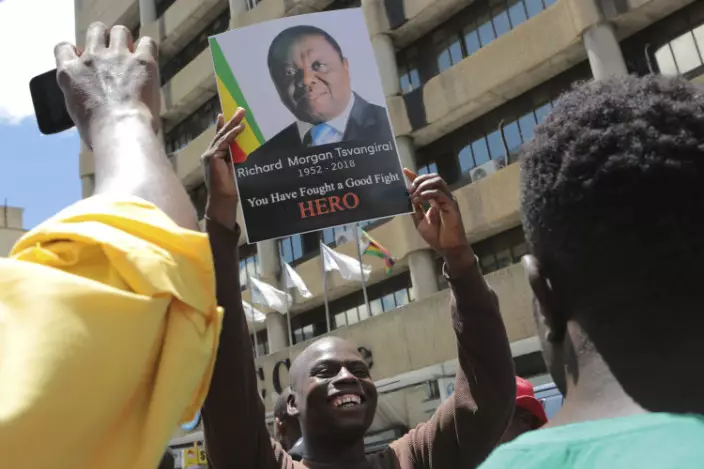
Supporters of Morgan Tsvangirai can hardly hold back their tears outside the party headquarters in Harare, Thursday, Feb, 15, 2018. (AP Photo/Tsvangirayi Mukwazhi)
A day after his death, thousands of mourning supporters gathered outside party headquarters while its leaders met to choose deputy party president Nelson Chamisa, a charismatic 40-year-old, as Tsvangirai's replacement "for the next 12 months."
But complications emerged immediately as the other deputy presidents, Elias Mudzuri and Thokozani Khupe, as well as several other senior officials boycotted the meeting. After violence from party youth, they abandoned plans for their own parallel meeting at Tsvangirai's home.
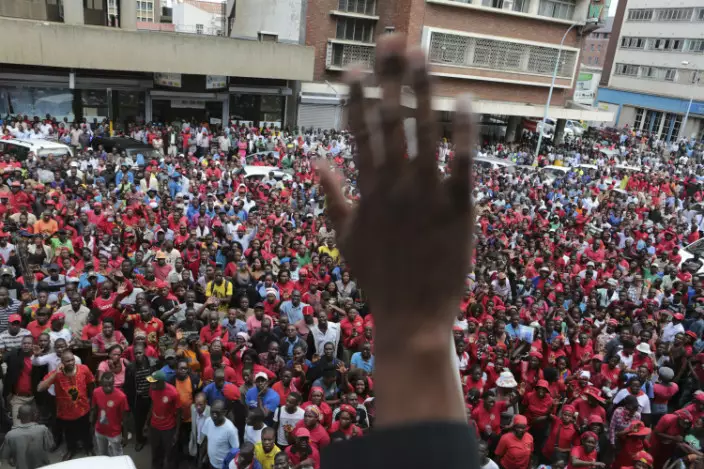
Newly elected Leader of the opposition Movement For Democtractic Change (MDC) party, Nelson Chamisa greets the crowd outside the party headquarters in Harare, Thursday, Feb, 15, 2018.
(AP Photo/Tsvangirayi Mukwazhi)
Some party members are disputing Chamisa's appointment, saying Mudzuri, who was acting leader for a while as Tsvangirai underwent treatment, or Khupe is the MDC-T's acting leader or rightful heir.
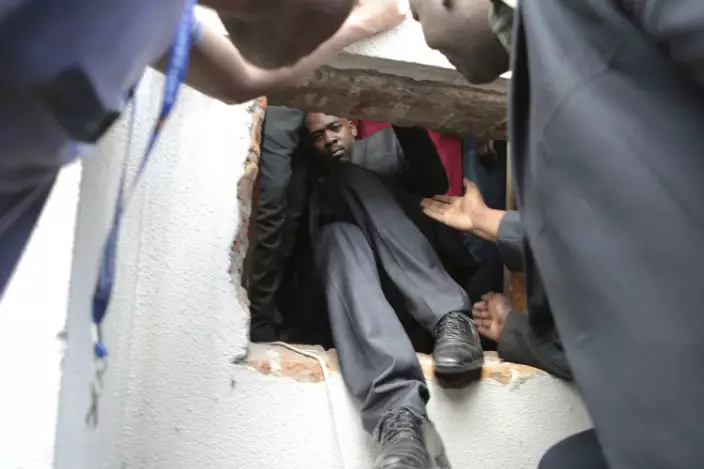
Newly elected Leader of the opposition Movement For Democtractic Change (MDC) party, Nelson Chamisa makes his way through an opening to address the crowd at the party headquarters in Harare, Thursday, Feb, 15, 2018. (AP Photo/Tsvangirayi Mukwazhi)
The opposition party once posed the sternest challenge to former leader Mugabe and his ruling ZANU-PF party since the southern African nation's independence from white minority rule in 1980.
But with Tsvangirai gone, his party seems headed for an uncertain future at a time when a chance to seize power after Mugabe's departure approaches. Mugabe, who led Zimbabwe for 37 years, made a dramatic resignation in November after the military moved in and inspired the ruling party to turn against him.
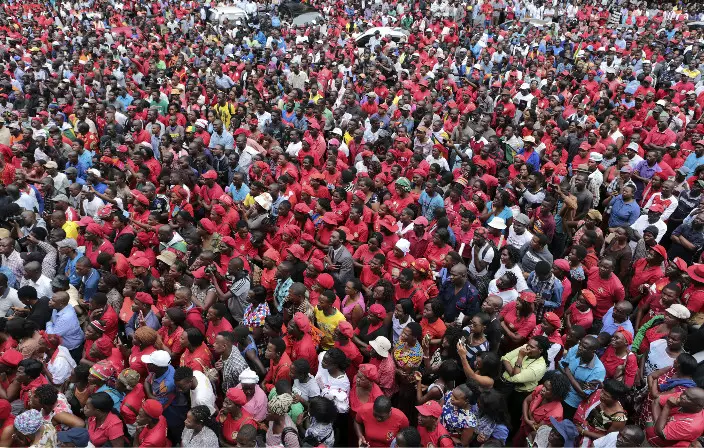
Newly elected Leader of the opposition Movement For Democtractic Change (MDC) party, Nelson Chamisa greets the crowd outside the party headquarters in Harare, Thursday, Feb, 15, 2018. (AP Photo/Tsvangirayi Mukwazhi)
Now Mnangagwa, Mugabe's longtime ally, is in charge and is reaching out to the international community after years of sanctions over alleged human rights abuses and rigged elections, hoping to bring in badly needed foreign investment to revive a collapsing economy.
The United States, Britain and others have made clear that holding credible elections in the coming months is key to those efforts. The constitution says elections should be between July 23 and Aug. 21, though Mnangagwa has hinted they could be held earlier, perhaps in May.
A day after Tsvangirai's death, Mnangagwa expressed condolences and said the upcoming elections must be free and fair "in tribute to him."
Even as some in Zimbabwe worry that Mnangagwa is merely a continuation of Mugabe's administration and express concern about the military's influence on government, the opposition struggles to come up with a united challenge.
"The time for power struggles is over," Chamisa told the thousands of MDC-T supporters Thursday in the capital, Harare. "Mudzuri and Khupe should unite behind our efforts to remove ZANU-PF."
Some in Zimbabwe said the opposition's public displays of discord are disrespectful of Tsvangirai, who was jailed, beaten and accused of treason in his years of resisting Mugabe's government and even became prime minister in an uncomfortable coalition government for a few years.
"One of the most glaring ironies of this moment is that those who fought him are showing him respect while those with fought with him are fighting each other and showing disrespect. Comrades, you are allowing power to get in the way of reason and dignity," tweeted Alex Magaisa, a law lecturer at Kent University in Britain and former adviser to Tsvangirai.
The upcoming election will be the first without Tsvangirai since 2002. An opposition alliance had endorsed him as its candidate, even as the ailing leader in January said he was "looking at the imminent prospects of us as the older generation leaving the levers of leadership to allow the younger generation to take forward this huge task."
In the end, the opposition leader made the same mistake that Mugabe did, political analyst Alexander Rusero said: Even as his health deteriorated Tsvangirai failed to "anoint" a successor.
ST. LOUIS (AP) — Missouri's execution protocol allows for “surgery without anesthesia” if the typical process of finding a suitable vein to inject the lethal drug doesn't work, lawyers for a death row inmate say in an appeal aimed at sparing his life.
Brian Dorsey, 52, is scheduled for execution Tuesday for killing his cousin and her husband at their central Missouri home in 2006. His attorneys are seeking clemency from Gov. Mike Parson and have several appeals pending.
A federal court appeal focuses on how Missouri injects the fatal dose of pentobarbital. The written protocol calls for insertion of primary and secondary intravenous lines. But it offers no guidance on how far the execution team can go to find a suitable vein, leaving open the possibility of an invasive “cutdown procedure,” Dorsey's attorneys say.
The procedure involves an incision that could be several inches wide and several inches deep. Forceps are used to tear tissue away from a vein that becomes the injection point.
“It's surgery,” said Arin Brenner, a federal public defender and one of the attorneys representing Dorsey. “It would be surgery without anesthesia.”
Brenner said Dorsey faces a higher-than-normal risk of needing a cutdown because he is obese. His veins also might be compromised because he is diabetic and a former IV drug user.
A spokesperson for Attorney General Andrew Bailey didn't comment but referred to the state's response to the appeal.
“Cut-down procedures are rarely, if ever, used under Missouri’s execution protocol,” the response stated. “And in the event that a cut-down procedure were necessary, medical personnel have access to pain relieving medications.”
Medication would be inadequate and if the procedure is necessary, Dorsey should receive a local anesthetic, said Megan Crane, another attorney for him.
“It is extremely painful," Crane said. “Even if given an oral pain relief or an opioid, that will not relieve the pain.”
Lawyers for Dorsey say use of the surgical procedure would violate his constitutional guarantee against cruel and unusual punishment and also his right to religious freedom, because it would prevent him from having meaningful interaction with his spiritual adviser, including the administration of last rites.
The issue isn't theoretical. In Idaho, the scheduled execution of serial killer Thomas Eugene Creech in February was halted after a medical team unsuccessfully tried eight times establish an IV. It is unclear whether, when or how the state might try again to execute him.
Missouri's execution process is shrouded in secrecy, so it's impossible to know if, or how often, cutdown procedures have been required. No independent observer sees the IV line inserted. The spiritual adviser doesn't enter the room until the preparation is complete. Witnesses sit in dark rooms with curtains drawn until corrections officers open them seconds before the drug is injected.
Attorneys for Dorsey wonder if a cutdown procedure was used in January 2023 when Amber McLaughlin was executed. It was believed to be the first execution of an openly transgender person in the U.S.
The Rev. Lauren Bennett of St. Louis served as McLaughlin's spiritual adviser. She recalled McLaughlin saying, “Ouch, ouch, ouch. It hurts," but said McLaughlin was unable to explain the cause of her pain before her death.
Issues with the IV have been problematic in executions elsewhere.
In 2014, Oklahoma inmate Clayton Lockett was declared dead 43 minutes after his execution began, at times writhing in pain and clenching his teeth through the process. A state investigation showed that the execution team repeatedly failed to insert an IV line in his arms, jugular vein, foot and subclavian vein in the upper torso, before eventually running a line through a vein in Lockett’s groin.
The review found that Lockett died after the line came loose, and that the deadly chemicals were pumped into the tissue surrounding the injection site instead of directly into his bloodstream. There is no indication in the report that Lockett was ever given an anesthetic.
In 2022, it took more than three hours to execute Joe Nathan James Jr. in Alabama. The state said the process was delayed because of difficulties establishing an IV line. Dr. Joel Zivot, a professor of anesthesiology at Emory University and an expert on lethal injection who witnessed the private autopsy, said he saw “multiple puncture sites on both arms” and two incisions in the middle of the arm, which he said were indications of efforts to perform a cutdown. It's unclear if he received anesthesia.
Messages were left Friday with corrections officials in Oklahoma and Alabama.
Dorsey, formerly of Jefferson City, was convicted of killing his cousin, Sarah Bonnie, and her husband, Ben, on Dec. 23, 2006, at their home near New Bloomfield. Prosecutors said that earlier that day, Dorsey called Sarah Bonnie seeking to borrow money to pay two drug dealers who were at his apartment.
Dorsey went to the Bonnies’ home that night. After they went to bed, Dorsey took a shotgun from the garage and killed both of them before sexually assaulting Sarah Bonnie’s body, prosecutors said.
Sarah Bonnie’s parents found the bodies the next day. The couple’s 4-year-old daughter was unhurt.
In the clemency petition, 72 current and former state correctional officers asked Parson, a Republican and a former county sheriff, to commute Dorsey’s sentence to life in prison, citing his virtually spotless record of good behavior while in prison.
“The Brian I have known for years could not hurt anyone,” one officer wrote. “The Brian I know does not deserve to be executed.”
A spokesperson said Parson is still reviewing the clemency request.
An appeal to the U.S. Supreme Court centers on the $12,000 flat fee for Dorsey's court-appointed trial attorneys. The appeal argues that with the flat fee, his lawyers had a financial incentive to resolve the case quickly. They encouraged Dorsey to plead guilty, but with no demand that prosecutors agree to life in prison instead of the death penalty.
Dorsey's attorneys also had asked the Missouri Supreme Court to stay the execution on the grounds that the Department of Corrections' acting director, Trevor Foley, has not been confirmed by the state Senate and is therefore unqualified to oversee an execution. The court denied that request Friday.
AP reporter Sean Murphy in Oklahoma City contributed.
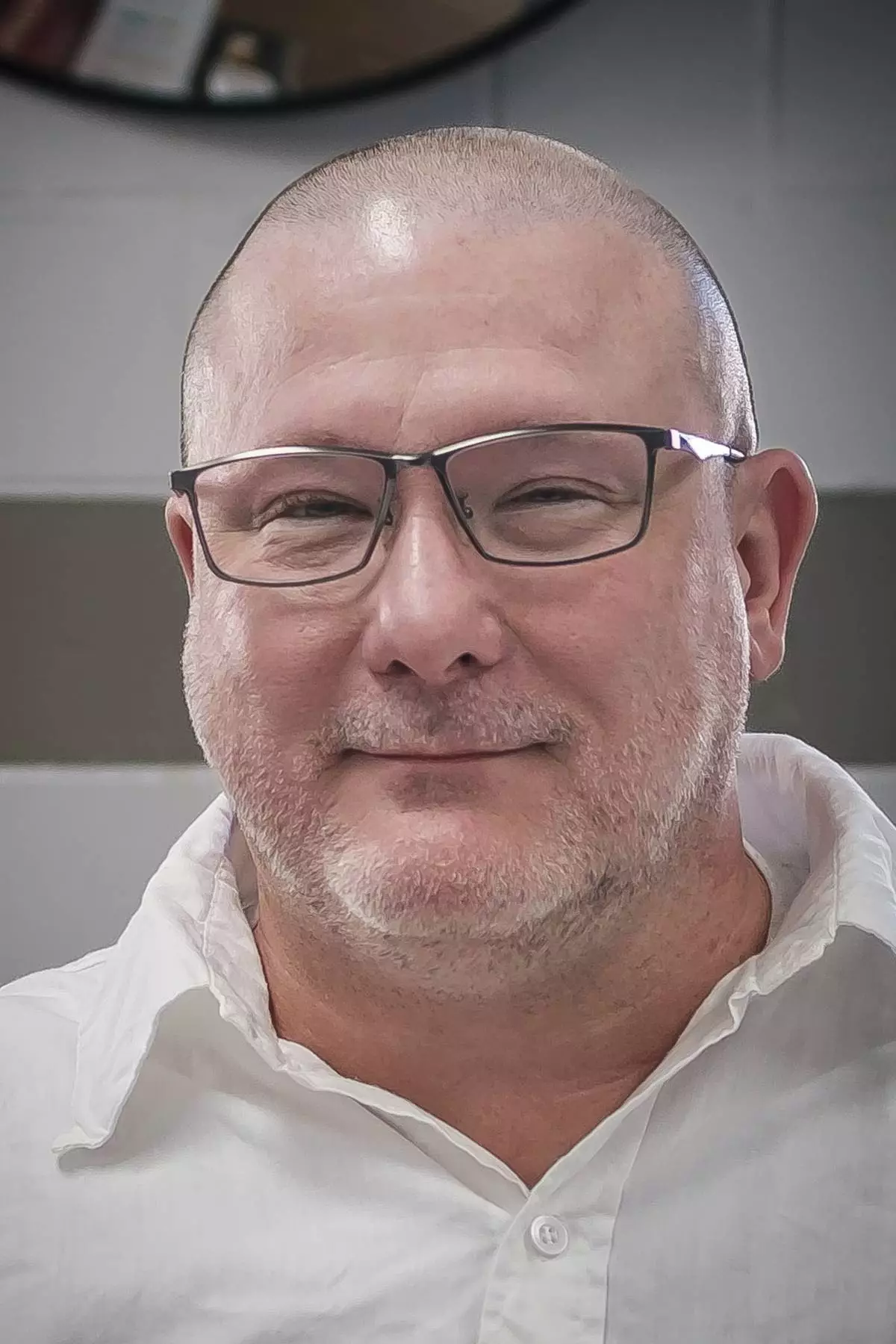
A photo released by the Federal Public Defender, shows inmate Brian Dorsey at the Potosi Correctional Center, Washington County, Missouri. Dorsey is scheduled to be executed Tuesday, April 9, 2024, for killing two people in 2006. (Jeremy Weis, Federal Public Defender via AP)
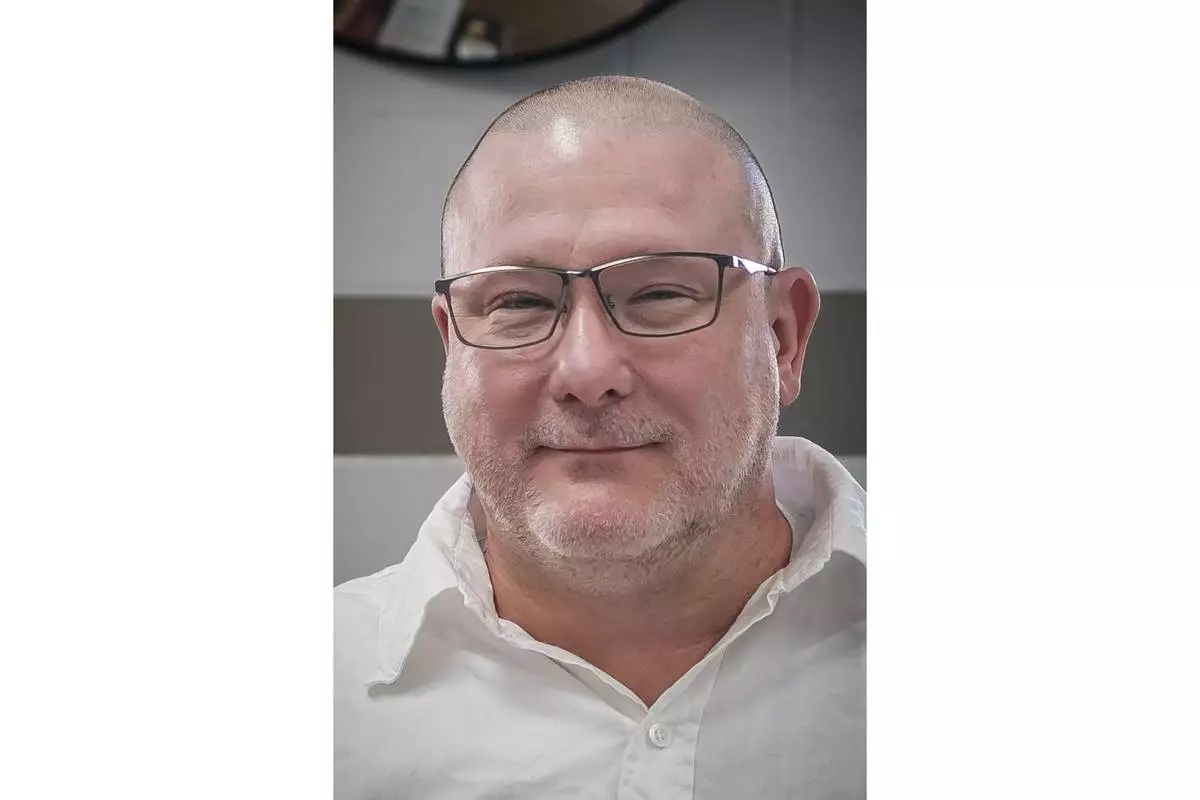
A photo released by the Federal Public Defender, shows inmate Brian Dorsey at the Potosi Correctional Center, Washington County, Missouri. Dorsey is scheduled to be executed Tuesday, April 9, 2024, for killing two people in 2006. (Jeremy Weis, Federal Public Defender via AP)










